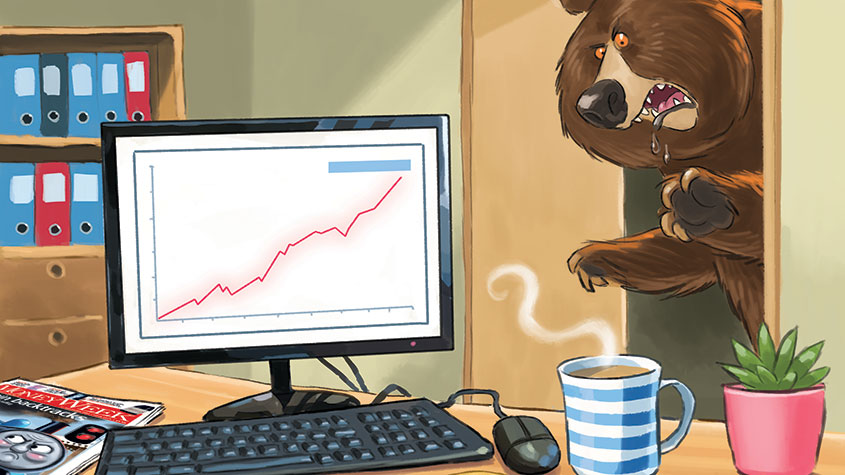Why the demise of public markets should have you worried
Too many companies are either not listing or going private, says Merryn Somerset Webb. That diverts the returns to the few, not the many.

Get the latest financial news, insights and expert analysis from our award-winning MoneyWeek team, to help you understand what really matters when it comes to your finances.
You are now subscribed
Your newsletter sign-up was successful
Want to add more newsletters?

Twice daily
MoneyWeek
Get the latest financial news, insights and expert analysis from our award-winning MoneyWeek team, to help you understand what really matters when it comes to your finances.

Four times a week
Look After My Bills
Sign up to our free money-saving newsletter, filled with the latest news and expert advice to help you find the best tips and deals for managing your bills. Start saving today!

Bad news for WeWork this week. Turns out the public market just isn't that into it. Investors reckon there is a strong chance that the model (long-term debt on buildings let out to short-term tenants, with a little free beer chucked in along the way) might be unsustainable. Given that chance, they decided that they weren't mad to pay to value the company at the $65bn it originally thought might make sense, or for that matter, even half of $65bn (maybe $15bn but really not much more). The initial public offering (IPO) has been pulled. Perhaps investors are beginning to see sense when it comes to unicorn IPOs (see moneyweek.com for more).
Still, loss-making companies with pretend-disruptive business plans and no pathway to profit coming to market at stupid prices aren't the only thing the market reckons to be unsustainable. You can also be a highly profitable entity with a multi-decade record of paying out reliable annuity-style dividends and be just as spurned if you are involved in any way in the fossil fuel industry, for example. Pension funds around the world, charities, family trusts and even the Church of England have been busily divesting from fossil fuel stocks in an effort to show just how much they disapprove of the whole business. This enthusiasm has so far had very little effect on the environment. As Bill Gates notes, thanks to the fact that few fossil fuel businesses need to raise new capital from the market anyway, they don't care who wants or doesn't want their shares. Result? Divestment has so far "reduced about zero tonnes of emissions".
It has, however, had a different and interesting effect: pushing share prices in the sector down, and yields in it up. Before the latest leap in the oil price (short-term oil bears should note that the upside risk of politics taking oil prices hostage has been a constant for as long as any of us at MoneyWeek can remember) BP was yielding 6.4%. And even on this week's price it is offering 6%. That's nice. But it might also be something to worry about. One of our big concerns is that too many companies are either not listing or going private something that offers the returns to the few, not the many. If fossil fuel and resources firms get more reviled and hence cheaper, they will leave public markets too (they can they need neither the new capital nor the constant nagging). Then, just as retiring MoneyWeek readers could do with their yields, those yields won't be available anymore. That's a shame given the choice of financing 20 years of retirement from the returns from WeWork shares (the IPO is now scheduled for October) or from the dividends being thrown off by fossil fuel firms as they run their businesses down, I know what I would choose.
MoneyWeek
Subscribe to MoneyWeek today and get your first six magazine issues absolutely FREE

Sign up to Money Morning
Don't miss the latest investment and personal finances news, market analysis, plus money-saving tips with our free twice-daily newsletter
Don't miss the latest investment and personal finances news, market analysis, plus money-saving tips with our free twice-daily newsletter
Finally, a note on politics. What happens if one way or another we end up remaining in the EU? That might seem absurd to ordinary democrats, but it isn't impossible at all given how fantastically the post-vote Remain campaign has been run (the evidence for this being that three years after a fairly clear referendum result we are still in the EU). You might think that revoking Article 50 would make everything okay again (as Jo Swinson obviously does). We'll stick with the status quo. No change. Nothing to worry about. If you do think this however, you think wrong. Completely wrong.
Get the latest financial news, insights and expert analysis from our award-winning MoneyWeek team, to help you understand what really matters when it comes to your finances.

-
 Early signs of the AI apocalypse?
Early signs of the AI apocalypse?Uncertainty is rife as investors question what the impact of AI will be.
-
 Reach for the stars to boost Britain's space industry
Reach for the stars to boost Britain's space industryopinion We can’t afford to neglect Britain's space industry. Unfortunately, the government is taking completely the wrong approach, says Matthew Lynn
-
 What to do as the age of cheap money and overpriced equities ends
What to do as the age of cheap money and overpriced equities endsEditor's letter The age of cheap money, overpriced equities and negative interest rates is over. The great bond bull market is over. All this means you will be losing money, says Merryn Somerset Webb. What can you do to protect yourself?
-
 House prices to crash? Your house may still be making you money, but not for much longer
House prices to crash? Your house may still be making you money, but not for much longerOpinion If you’re relying on your property to fund your pension, you may have to think again. But, says Merryn Somerset Webb, if house prices start to fall there may be a silver lining.
-
 Investors are bullish – but be very careful
Investors are bullish – but be very carefulEditor's letter Many investors are buying the dip, convinced the latest upswing is the start of a new bull market. The odds are that it’s not, says Andrew Van Sickle. The bear has unfinished business.
-
The MoneyWeek approach to investing
Editor's letter At MoneyWeek, our aim is simple: to give you intelligent and enjoyable commentary on the most important financial stories, and tell you how to profit from them. So how do we do that?
-
 Prepare your portfolio for recession
Prepare your portfolio for recessionOpinion A recession is looking increasingly likely. Add in a bear market and soaring inflation, and things are going to get very complicated for investors, says Merryn Somerset Webb.
-
 Celebrity bitcoin ads echo the subprime mortgage crisis
Celebrity bitcoin ads echo the subprime mortgage crisisEditor's letter A wave of ads featuring celebrities punting crypto to the masses are reminiscent of how low income Americans were encouraged to take on loans they couldn’t afford, says Merryn Somerset Webb.
-
 Investing for income? Here are six investment trusts to buy now
Investing for income? Here are six investment trusts to buy nowOpinion For many savers and investors, income is getting hard to find. But it's not impossible to find, says Merryn Somerset Webb. Here, she picks six investment trusts that are currently yielding more than 4%.
-
 Will the UK's property slowdown turn into a house-price crash?
Will the UK's property slowdown turn into a house-price crash?Editor's letter As the cost-of-living crisis intensifies and interest rate rise, it is hard to see reasons for UK house prices to keep rising, says Merryn Somerset Webb.